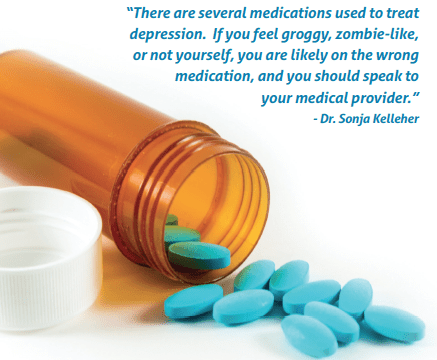The Signs & When to Seek Help
In the 18th century, poet St. John of the Cross coined the phrase “dark night of the soul” to describe a 45-year spiritual crisis. Mental health professionals have since adopted it to describe clinical depression, a mood disorder severe enough to require clinical intervention.
By Rashad Gober
Losing a loved one, relationship problems, money worries, or losing your job can be intensely painful. It’s normal for these situations and others like them to leave us feeling sad and discouraged. But what if you’re never able to “bounce back”? What if your despair continues to interfere with your ability to live a normal life? If this describes your situation, you may be one of almost 18.8 million Americans experiencing clinical depression, also known as major depressive disorder.


Psychiatrist, Parkridge
Valley Hospital
Sadness vs. Depression:
How Can You Know the Difference?
Clinical depression is more intense than a normal bout of sadness. When someone is clinically depressed, good habits and strategies aren’t enough to lift the dark veil. “Important differences between sadness and depression relate to duration and severity,” explains Dr. Tamunosaki Lawson, a psychiatrist with Parkridge Valley Hospital. “Everyone suffers from low mood from time to time, but it is usually situational. Depression is prolonged and severe. The person continues to lack interest in daily activities and motivation to participate in life.”
“The other factor is hopelessness,” he continues. “The feeling of ‘I’m never going to get better.’ ‘This is the way it’s going to be for the rest of my life.’ ‘Things are not going to change, so why try?’”
Getting Unstuck
There is great danger in not dealing with depression, because without intervention, it is likely to get worse. The further you spiral into depression without addressing it, the more you put your future at risk. If you think you may be depressed, here are two very basic, but important, steps you can take on your path to healing.
Step 1: Acknowledgement. The first step in “getting unstuck” is recognizing that you are depressed – a step often much easier said than done. If you’re curious about whether you might be depressed, The Center for Epidemiologic Studies has developed a depression screening tool (CESD-R) available for use in the public domain at cesd-r.com. This test measures for symptoms defined by the DSM-V (see above).
Step 2: Reaching out. The second step in addressing depression is to get help. This involves allowing yourself to tell someone you trust about what you’re experiencing. “The most important thing you can do is to talk to friends, family members, and a physician about how you feel even though you may feel like things won’t get better,” says Dr. Lawson. “Your perception may be skewed, and sharing your feelings is often the first step in realizing that a condition is making you feel that way.”

Seeing a Doctor
If you think you may be depressed, one of the most important measures you can take is to discuss your concerns with your health care provider. Doctors do not stigmatize depression — in fact, they have training to hear and address your concerns.
When you make an appointment with a general practitioner (GP), it can be helpful to go into the meeting prepared. You may want to write down how you’re feeling beforehand and plan to discuss your most severe symptoms first. Be sure to tell the whole story and be completely honest (this is where a friend’s accountability can be helpful).
Your GP will discuss your symptoms with you and rule out any physical conditions that could be causing your low mood. Based on your full assessment, he or she may prescribe an antidepressant to treat your depression.


Erlanger South Family Medicine
If you don’t have a good experience with a particular antidepressant, don’t give up. It usually takes time to see a real change in your mood. “You do not want to abruptly stop any antidepressant medications,” says Dr. Sonja Kelleher with Erlanger South Family Medicine. “It may take four to eight weeks on the medication to see the full benefit.”
If you don’t experience any change in your mood after a few weeks, talk with your doctor
– you may need to try a different medication. It may take some trial and error to find the right option for you. “There are several medications used to treat depression,” says Dr. Kelleher. “If you feel groggy, zombie-like, or not yourself, you are likely on the wrong medication, and you should speak to your medical provider.”
When starting treatment, it’s also critical to keep all of your follow-up appointments. One of the most common causes of repeat admittance to a mental health facility is non-adherence to treatment. Once an antidepressant is effective in lifting the fog of depression, many patients think, “I feel better, so I’ll stop taking my medicine,” rather than understanding that the medicine is why they feel better.
What Depression is Not
When you’re in the middle of a depressive episode, you may be ashamed of how you feel or view yourself as weak. This stigma and other self-defeating views of depression prevent many sufferers from seeing a doctor. But in reality, depression is a common (affecting one in five people at some stage in their life) and very serious medical condition.
“People with depression often fear others perceiving them as unable to deal with the stressors of life, but depression is not laziness or weakness,” says Dr. Kelleher. “Depression is a disease of the brain and there are ways to manage the disease.”
Small Steps, Not Giant Leaps
Once you embark down the path of treating depression, there’s often a tendency to be overambitious right away. Depression is heavy, and sufferers often want the fastest route to relief. However, taking care of yourself and managing your depression is more likely to come in small steps, not giant leaps. Some baby steps that can help you along your journey toward health and balance include working to get adequate sleep, exercising, and limiting alcohol intake.
Another step in the right direction is learning how to cope with negative thought patterns. This is something best approached with the help of a therapist or counselor. Reactivating relationships and social networks that may have fallen by the wayside is an additional way to combat your depression. Talking with friends and mentors is a good way to put words to your feelings.
Want to learn more?
The National Alliance on Mental Illness (NAMI) is an excellent resource for learning more about mental illness and its symptoms. For up-to-date research and in-depth information about depression, you can also check out the National Institute of Mental Health (NIMH).
These are just a few of the many places you can find more information about depression. But if your low mood continues, make an appointment to see your doctor and explore your treatment options. Depression does not have to rule your life. With appropriate treatment, things can get better. Your “dark night of the soul” can transform into a stunning sunrise.

